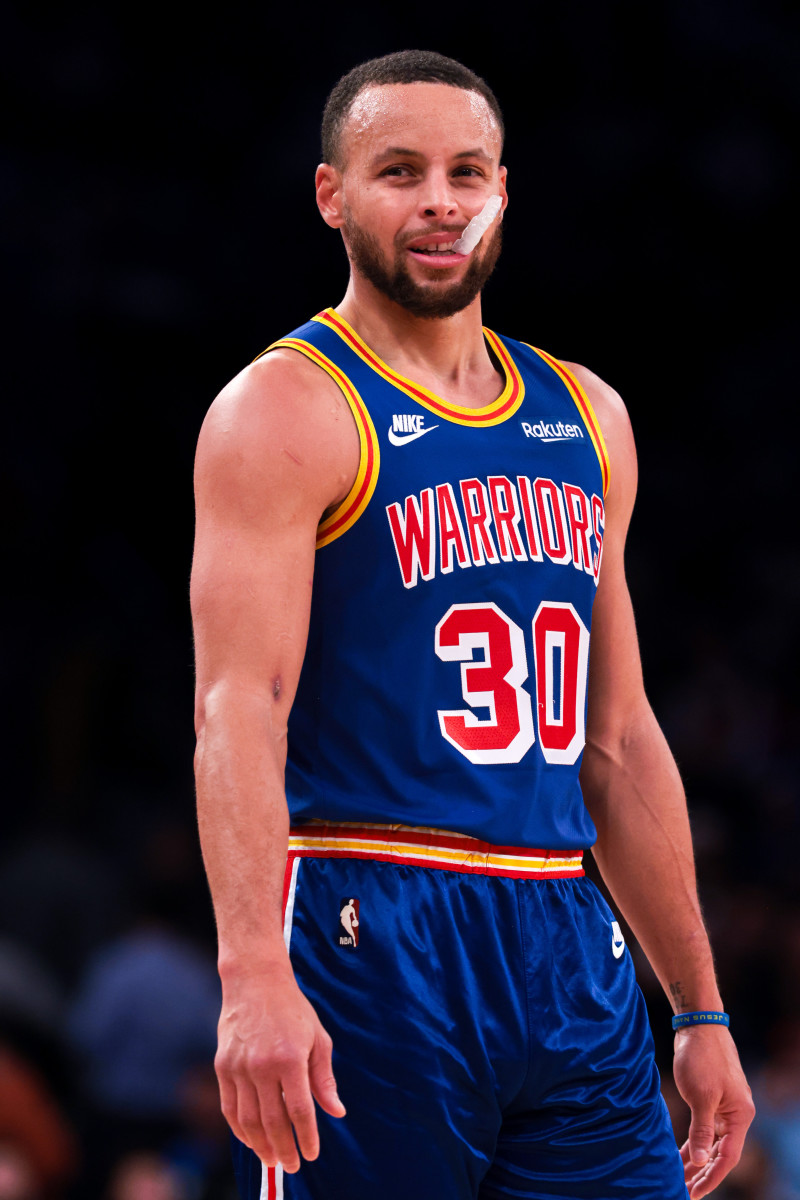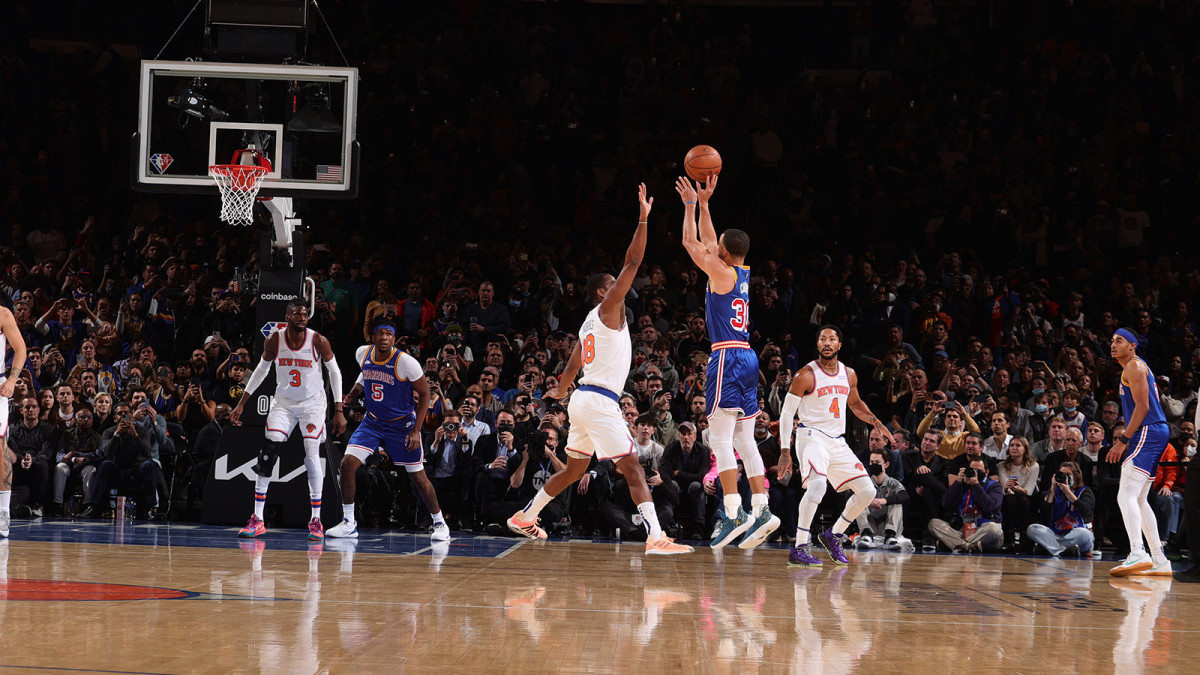‘Hopefully, I Can Push It to a Point That‘s Untouchable’: Inside Stephen Curry's Record-Breaking Night

NEW YORK — The greatest shooter in NBA history pulled on a sweatshirt proclaiming “All-Time 3PT Record Holder” and a hat that said, “2,974 and counting,” yet none of these inscriptions sufficiently captured the man or the moment Tuesday night.
Steph Curry seized the three-point shooting crown by hitting his 2974th, 2975th, 2976th and 2,977th shots from beyond the arc in a Warriors victory over the Knicks at Madison Square Garden. He received warm embraces from Ray Allen—who set the record of 2,973 in 2011—and from Reggie Miller, who surrendered the record to Allen. He was bathed in admiration and well wishes from teammates and friends and his parents, Dell and Sonya. The emotions were palpable.
Yet the greatest impact could not be properly measured or seen or felt—only intuited. Somewhere in the stands, or among the millions who watched on TV or on a cellphone, possibly on another continent, was a young shooter who was just inspired to join the chase himself.
Twelve years ago, Curry—skinny, baby-faced and wildly underestimated—arrived in an NBA that was just beginning (often reluctantly) to embrace the three-point shot as a primary weapon. Now the shot is essential, universal, as integral as the fast break and the slam dunk, a go-to weapon for guards and 7-footers alike. Because Curry, through sheer will and audacity and persistence and precision, made it so.
His legacy is not a number, but a paradigm shift.
“You see how many guys are shooting, or the volume of threes that are getting taken in a game, the way that teams are being constructed to use the three ball as a weapon,” Curry, trying to assess his own impact, told SI.com late Tuesday. “So I definitely understand it. I don’t know how you quantify it. But it’s moreso just the feeling of, it’s a fun way to play the game, but you got to put the work in. And hopefully I can stand alone, with the body of work, when it’s all said and done. But definitely understand that things have changed drastically, and I have a lot to do with that.”
When Curry was drafted in 2009, NBA teams averaged 18 three-point attempts per game. Now they average 35.4. In Curry’s rookie season, just four players averaged six or more three-point tries per game. This season, it’s 54.
The three-point revolution has many authors, as Warriors coach Steve Kerr dutifully noted: Don Nelson, the innovative former coach of the Golden State and Dallas; Mike D’Antoni, who spread the gospel with the Suns and Rockets; Allen and Miller, of course.
“But Steph is the guy who grabbed it and ran with it,” Kerr said. “He changed the way the game is played, the way young players think about the game, the way the entire league feels about the shot.”
And Curry took the shot where no one else could: further, deeper, more frequent, from every possible quadrant and angle and disposition, off passes or off the dribble, off screens, off step-backs, in transition or at a standstill, off movement or no movement at all.

Curry—along with fellow three-point evangelist and Splash Brother Klay Thompson—powered the Warriors to a championship, then a 73-win season, making Curry a back-to-back MVP, the first unanimous MVP and the first ever to claim that award on the strength of long-distance shooting.
“It's a different game, obviously,” Kerr said of this era. “But Steph made it a different game.”
So now we have Dame and Trae, Harden and Hield, LaMelo and Luka and countless others itching to do what Steph does, though no one does it quite as well. Curry has hit 400 more threes than James Harden, 800 more than Damian Lillard and 1,000 more than the next cluster of modern shooters (including Thompson, JJ Redick, Paul George and Kyle Lowry).
Yes, Curry enjoys a freedom that Allen and Miller and Dale Ellis never did in their time. It took him just 789 games to break a record that Allen needed 1,300 to set. But it’s the accuracy and consistency—a 43% mark across 12-plus seasons and more than 6,900 attempts—that makes Curry truly special. He is the avatar of the three-point era, by far the best shooter in an era when almost everyone shoots from distance.
Allen, whose shooting form was practically hailed as a work of art, made 40% of his 7,429 shots from the arc. Miller, the first true go-to three-point shooter, made 39.5% of his 6,486 attempts.
And Curry’s modern rivals? Harden has hit just 36.3% of his threes. Lillard, 37.2%.
“The balance of volume and efficiency for me has been something that I pride myself on,” Curry said.
No one in basketball history has shot the three as beautifully and as often, or with as much flair or pure joy. No one made it a must-see thrill or sparked the imagination quite like Curry has. Tuesday’s game was a testament to it all. At a glance, there were more fans wearing Curry’s No. 30 jersey than those wearing Julius Randle’s No. 30. In the game’s opening minutes, every Curry possession set off a wave—every fan rising to their feet in anticipation, knowing he needed just two threes to set the record.

He swished the first, an off-the-dribble 29-footer, just 64 seconds after tipoff. Three minutes later, he nailed the second—a 28-footer off a kickout pass from Andrew Wiggins. Kevon Looney fouled someone to stop the clock. And then, a happy bedlam and a standing ovation that lasted at least five minutes but seemed like 15.
“Felt like we were at home,” Curry said.
“Beautiful,” said teammate Draymond Green.
The record could have been set in Philadelphia on Saturday, but the Sixers’ defense flustered Curry into a 3-for-14 shooting night from the arc. The moment could have come Monday in Indianapolis, but Curry missed 10 of his 15 tries, leaving him just short. So instead Curry broke the record in the basketball mecca, in the World’s Most Famous Arena, on the floor where he first put the world on notice—with a then-personal-best 54 points and 11 three-pointers in February 2013. This was symmetry, fate, kismet.
“There was definitely some divine intervention,” Curry said. “It's not like I didn't shoot enough over the last four games to try to get there a little faster. But everything happens as it should, and that's something that I've believed in my whole life.”
The title is his now, and will be for some time to come. Curry is just 33 and still playing at an MVP level, in an era where NBA athletes are extending their primes ever further. He’ll cross the 3,000 barrier soon, and given his proficiency, would it surprise anyone if he reached 4,000 before his career is over?
“Hopefully, I can push it to a point that's untouchable,” Curry mused.
Watch NBA games online all season long with fuboTV: Start with a 7-day free trial!
For those who dare give chase, the math becomes staggering. A young shooting stud would need to average 200 made threes per season for 15 years just to reach 3,000. But someone will try. Or several will. Because they’ve spent years watching Steph Curry do the impossible. And now nothing seems out of reach.
More NBA Coverage:
• Where Does Steph Curry Rank Among the Greats?
• NBA World Reacts to Curry Breaking Three-Point Record
• NBA Trade Ideas: Can the Warriors Land Sabonis?
• NBA Mailbag: Damian Lillard's Future With the Blazers
Sports Illustrated may receive compensation for some links to products and services on this website.
